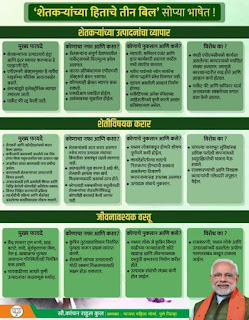*Farmer Bill: Why Congress is hypocrite*
Here's what Congress' stance has been on farmer's bill in the past:
1-The Farmers' Produce Trade and Commerce (Promotion and Facilitation) Bill, 2020: The bill seeks to provide for the creation of an ecosystem where the farmers and traders enjoy the freedom of choice relating to sale and purchase of farmers' produce.
Congress in the past:
Congress in its manifesto 2019 mentioned that “Congress will repeal the Agricultural Produce Market Committee’s Act and make trade in agriculture produce - including export and inter-state trade-free from all restrictions.
The UPA government prepared the draft Bill titled as “Agricultural Produce Inter State Trade and Commerce (Development and Regulation) Bill 2012”.
However, it was not pursued further.
Congress just before 2014 Lok Sabha elections publicly announced that Congress ruled states should de-notify the fruits and vegetables from the APMC Act.
In pursuance, Congress ruled states of Karnataka, Assam, Himachal Pradesh, Meghalya and Haryana de-notified the Fruits & Vegetables.
The UPA government led by Congress after coming into power in 2004 started persuasion with the states to adopt the Model APMC Act 2003 to liberalize the state agricultural marketing laws.
The UPA government also formulated the Model APMC Rules 2007 for implementation of Model APMC Act.
Cabinet Secretary while considering the Note for COS suggested in April, 2011 that to promote Inter-State Trade and Commerce of agriculture produce across States/UTs through the instrument of Central Legislation. This time also there was the rule of UPA led by Congress.
2) - The Farmers (Empowerment and Protection) Agreement of Price Assurance and Farm Services Bill, 2020 seeks to provide for a national framework on farming agreements that protects and empowers farmers to engage with agri-business firms, processors, wholesalers, exporters or large retailers for farm services and sale of future farming produce at a mutually agreed remunerative price framework in a fair and transparent manner.
Actions of Congress in the past:
Contract farming has been recognized as a chief enabler in various reports of the Planning Commission and has been implemented by many states under the State APMC Acts.
The 11th Five Year Plan, 2007–12, which was released during the tenure of the UPA government, mentions –
“Several States have amended the Agricultural Produce Marketing Committee Acts to allow private markets to be set up in competition with the existing mandis.”
Various states such as Andhra Pradesh, Assam, Chhattisgarh, Goa, Gujarat, Haryana (2007, INC), Himachal Pradesh, Jharkhand, Karnataka (2003, INC), Maharashtra (2006, INC-NCP), Madhya Pradesh (2003, INC), Mizoram, Nagaland, Odisha (2006, BJD), Rajasthan, Sikkim, Telangana, Tripura and Uttarakhand have made provisions for contract farming under the state APMC Act.
Three states including Punjab (2013, SAD), Tamil Nadu (2019, AIADMK), Odisha (2020, BJD) have passed separate Contract Farming Acts.
PepsiCo started working with farmers in Punjab in 1980s for pulping tomatoes and with orange farmers for making Tropicana juice.
Incidentally, from 1987-92, Punjab was under President’s Rule i.e. it was run by Central government.
It was mostly either Congress party in power in Central government or there were Governments led by Shri V. P. Singh and Shri Chandra Shekhar. From 1992 till 1997, again the Congress party was in power in Punjab.
3-The Essential Commodities (Amendment) Bill, 2020 seeks to to remove commodities like cereals, pulses, oilseeds, edible oils, onion and potatoes from the list of essential commodities.
This will remove fears of private investors of excessive regulatory interference in their business operations.
Actions of Congress in the past:
In 2019 Lok Sabha Elections Manifesto, Congress promised to replace the Essential Commodities Act, 1955 by an enabling law that can be invoked only in case of emergencies.
The Mid Term Appraisal of Eleventh Five Year Plan during UPA years states – “Improving marketing conditions and encouraging private sector participation require reforming the APMC Act and abolishing the Essential Commodities Act (ECA).
UPA constituted ‘Committee of State Ministers, In-charge of Agriculture Marketing to Promote Reforms’ under chairmanship of Shri Harshvardhan Patil, then Minister for Cooperation and Parliamentary Affairs, Govt. of Maharashtra.
In its report in 2013 stated – “…Essential Commodities Act and plethora of Orders promulgated under this Act by the Centre and States prevented development of free and competitive marketing system in the country.”
In Maharashtra, a similar Farmers Bill was already passed in 2006 when Congress was in power and is implemented ever since. It has created very good value chains in Nasik and benefitted farmers.
The Central Bill is an extension of the same bill.

Comments
Post a Comment